|
|
|
Sort Order |
|
|
|
Items / Page
|
|
|
|
|
|
|
| Srl | Item |
| 1 |
ID:
091696
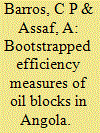

|
|
|
|
|
| Publication |
2009.
|
| Summary/Abstract |
This paper investigates the technical efficiency of Angola oil blocks over the period 2002-2007. A double bootstrap data envelopment analysis (DEA) model is adopted composed in the first stage of a DEA-variable returns to scale (VRS) model and then followed in the second stage by a bootstrapped truncated regression. Results showed that on average, the technical efficiency has fluctuated over the period of study, but deep and ultradeep oil blocks have generally maintained a consistent efficiency level. Policy implications are derived.
|
|
|
|
|
|
|
|
|
|
|
|
|
|
|
|
| 2 |
ID:
150676


|
|
|
|
|
| Summary/Abstract |
We analyze the relationship between carbon intensity and EPI and find that the informational content of EPI is in large part explainable by the state of economic growth and level of carbon intensity, with the second variable being already an increasing function of emissions and a decreasing function of economic well being. Carbon intensity has the largest explanatory power for EPI rankings and consistently produces the correct, anticipated, negative sign in its relationship to EPI. Second in importance are the renewable energy sources, which also produce consistent results with respect to their impact on the EPI but with much lower explanatory power. Our results suggest that advanced countries should, as they are doing already, implement measures of high quality environmental content while measures for increasing economic growth, while controlling emissions, are appropriate for developing countries. A number of other energy policy implications and the use of new technologies are also discussed in the context of our analysis.
|
|
|
|
|
|
|
|
|
|
|
|
|
|
|
|
| 3 |
ID:
139656
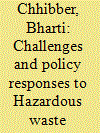

|
|
|
|
|
| Summary/Abstract |
Toxic hazardous waste must be treated and managed properly before disposal to avoid dangerous repercussions on human health. According to Bharti Chhibber waste management requires an integrated approach, which calls for team effort and cooperation between industry and government agencies. In India, much of the waste produced could be recycled but this requires innovative efforts and intensive planning.
|
|
|
|
|
|
|
|
|
|
|
|
|
|
|
|
| 4 |
ID:
145410
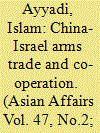

|
|
|
|
|
| Summary/Abstract |
Israel and China have quietly developed a significant arms trade since the 1970s. This article examines the history of the development of the Israel-China arms trade, its ramifications for wider international relations including those between the US and Israel, the US and China, and also foreign policy implications for China and the Middle-East.
|
|
|
|
|
|
|
|
|
|
|
|
|
|
|
|
| 5 |
ID:
115626
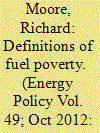

|
|
|
|
|
| Publication |
2012.
|
| Summary/Abstract |
This paper outlines why the definition of fuel poverty is important in policy formulation and describes how the Government's current definitions evolved from the original concept. It discusses the determination of income and fuel costs and the possibilities for a relative and common European measure. It examines problems inherent in assessing fuel costs as a percentage of income and puts forward the arguments for a 'budget standard' approach. The paper illustrates how the size of the problem depends on the definition and chosen threshold and suggests advantages for a rating scale. It illustrates how the income composition and thresholds also govern the distribution of the target populations and the relative importance of the main causal factors, and examines the consequent policy implications. It explores the definition of vulnerable households and the importance of severity and questions whether the UK fuel poverty strategy is targeted at households least able to afford their fuel costs (as the name implies) or primarily those at risk from excess winter and summer mortality and morbidity. Finally, after examining the role of supplementary indicators, it looks at the opportunities for changing the definition and comments on the Government review of the definition and targets.
|
|
|
|
|
|
|
|
|
|
|
|
|
|
|
|
| 6 |
ID:
128027
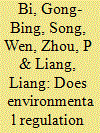

|
|
|
|
|
| Publication |
2014.
|
| Summary/Abstract |
Data envelopment analysis (DEA) has gained much popularity in performance measurement of power industry. This paper presents a slack-based measure approach to investigating the relationship between fossil fuel consumption and the environmental regulation of China's thermal power generation. We first calculate the total-factor energy efficiency without considering environmental constraints. An environmental performance indicator is proposed through decomposing the total-factor energy efficiency. The proposed approach is then employed to examine whether environmental regulation affects the energy efficiency of China's thermal power generation. We find that the environmental efficiency plays a significant role in affecting energy performance of China's thermal generation sector. Decreasing the discharge of major pollutants can improve both energy performance and environmental efficiency. Besides, we also have three main findings: (1) The energy efficiency and environmental efficiency were relatively low. (2) The energy and environmental efficiency scores show great variations among provinces. (3) Both energy efficiency and environmental efficiency are of obvious geographical characteristics. According to our findings, we suggest some policy implications.
|
|
|
|
|
|
|
|
|
|
|
|
|
|
|
|
| 7 |
ID:
171362
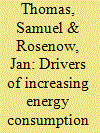

|
|
|
|
|
| Summary/Abstract |
Two years ago, the EU appeared to be well on the way to meeting its 2020 energy efficiency targets. 2014 final energy consumption was lower than in any year since the 1980s and lower than the level required in 2020. Since then, energy consumption has risen in two consecutive years and looks set to have kept on increasing. If these short-term trends continue, the 2020 targets will be missed. In this context, this paper analyses the drivers of recent increases in energy consumption, using index decomposition analysis breaking down changes in an aggregate indicator and assigning the effects to a number of predefined factors. We rely on a decomposition approach that is widely used across Europe and has been developed over more than 20 years as part of the Odyssee-Mure project. The paper also draws upon discussions at an expert workshop organised by the European Commission. The paper does identify areas where energy efficiency policies could be strengthened. We suggest that more ambitious policies are needed to drive improvements in building fabric and space heating efficiency, and that a greater focus on measurement, verification and enforcement of policies would improve the effectiveness of existing policies.
|
|
|
|
|
|
|
|
|
|
|
|
|
|
|
|
| 8 |
ID:
150341
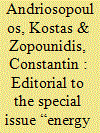

|
|
|
| 9 |
ID:
101692


|
|
|
|
|
| Summary/Abstract |
Does warfare affect the environment? This question has received some theoretical and empirical attention, but none of the extant studies has employed large-N statistical models. This article theorizes the possible effects of warfare on the environment and estimates large-N statistical models of these effects on CO2 emissions per capita, NOX emissions per capita, the rate of change in forested area, and a composite indicator of environmental stress reduction. The results indicate that warfare significantly affects the environment, but the signs and sizes of these effects depend on the environmental attribute (whether the fighting is at home or abroad) and development (whether the fighting country is developed or less developed). Warfare reduces CO2 emissions, but the effect is weaker in less developed countries (LDCs) than in developed countries (DCs). Warfare increases deforestation when fought at home and promotes forest growth when fought abroad, particularly in the LDCs. Warfare at home reduces NOX emissions for the LDCs and increases them for the DCs; warfare abroad increases NOX emissions for both the DCs and LDCs. Finally, warfare increases aggregated environmental stress, particularly for the LDCs when fought at home and for the DCs when fought abroad. The sizes of these effects are on par with or larger than the mandated or recommended policy goals stated by the US government for changes in CO 2 and NOX emissions, and by the World Bank (and by implication the DCs driving its policy) for the rate of deforestation, during the coming decade.
|
|
|
|
|
|
|
|
|
|
|
|
|
|
|
|
| 10 |
ID:
101693


|
|
|
|
|
| Publication |
2010.
|
| Summary/Abstract |
Does warfare affect the environment? This question has received some theoretical and empirical attention, but none of the extant studies has employed large-N statistical models. This article theorizes the possible effects of warfare on the environment and estimates large-N statistical models of these effects on CO2 emissions per capita, NOX emissions per capita, the rate of change in forested area, and a composite indicator of environmental stress reduction. The results indicate that warfare significantly affects the environment, but the signs and sizes of these effects depend on the environmental attribute (whether the fighting is at home or abroad) and development (whether the fighting country is developed or less developed). Warfare reduces CO2 emissions, but the effect is weaker in less developed countries (LDCs) than in developed countries (DCs). Warfare increases deforestation when fought at home and promotes forest growth when fought abroad, particularly in the LDCs. Warfare at home reduces NOX emissions for the LDCs and increases them for the DCs; warfare abroad increases NOX emissions for both the DCs and LDCs. Finally, warfare increases aggregated environmental stress, particularly for the LDCs when fought at home and for the DCs when fought abroad. The sizes of these effects are on par with or larger than the mandated or recommended policy goals stated by the US government for changes in CO 2 and NOX emissions, and by the World Bank (and by implication the DCs driving its policy) for the rate of deforestation, during the coming decade.
|
|
|
|
|
|
|
|
|
|
|
|
|
|
|
|
| 11 |
ID:
087668


|
|
|
|
|
| Publication |
2009.
|
| Summary/Abstract |
This article examines Georgia's efforts to gain NATO membership, focusing primarily on how closely Georgia meets NATO's political and military standards for applicant states as suggested in NATO's 1995 Study on Enlargement. In addition, this article assesses the transatlantic debate over enlargement at NATO's 2008 Bucharest Summit, and provides updated analysis of Georgia's military capabilities after its conflict with Russia over South Ossetia. The findings indicate that Georgia falls short of NATO's requested baseline measures for democratization and military modernization, and that the recent war in Georgia raises additional complications in Georgia's ambitions for alliance membership.
|
|
|
|
|
|
|
|
|
|
|
|
|
|
|
|
| 12 |
ID:
180101
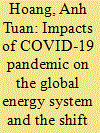

|
|
|
|
|
| Summary/Abstract |
Being declared a global emergency, the COVID-19 pandemic has taken many lives, threatened livelihoods and businesses around the world. The energy industry, in particular, has experienced tremendous pressure resulting from the pandemic. In response to such a challenge, the development of sustainable resources and renewable energy infrastructure has demonstrated its potential as a promising and effective strategy. To sufficiently address the effect of COVID-19 on renewable energy development strategies, short-term policy priorities should be identified, while mid-term and long-term action plans should be formulated in achieving the well-defined renewable energy targets and progress towards a more sustainable energy future. In this review, opportunities, challenges, and significant impacts of the COVID-19 pandemic on current and future sustainable energy strategies were analyzed in detail; while drawing from experiences in identifying reasonable behaviors, orientating appropriate actions, and policy implications on the sustainable energy trajectory were also mentioned. Indeed, the question is that whether the COVID-19 pandemic will kill us or provide us with a precious lesson on future sustainable energy development.
|
|
|
|
|
|
|
|
|
|
|
|
|
|
|
|
| 13 |
ID:
149969
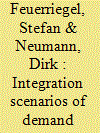

|
|
|
|
|
| Summary/Abstract |
Demand Response allows for the management of demand side resources in real-time; i.e. shifting electricity demand according to fluctuating supply. When integrated into electricity markets, Demand Response can be used for load shifting and as a replacement for both control reserve and balancing energy. These three usage scenarios are compared based on historic German data from 2011 to determine that load shifting provides the highest benefit: its annual financial savings accumulate to €3.110 M for both households and the service sector. This equals to relative savings of 2.83% compared to a scenario without load shifting. To improve Demand Response integration, the proposed model suggests policy implications: reducing bid sizes, delivery periods and the time-lag between market transactions and delivery dates in electricity markets.
|
|
|
|
|
|
|
|
|
|
|
|
|
|
|
|
| 14 |
ID:
144701
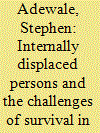

|
|
|
|
|
| Summary/Abstract |
Nigeria is facing a series of interconnected economic and humanitarian crises which, if not resolved, will disrupt basic life-support systems, contribute to the worsening of already fragmented security structures and perpetuate underdevelopment and indebtedness. Following the dispersal of the inhabitants of north-eastern Nigeria by Boko Haram, accessing adequate food, shelter and safe drinking water is becoming increasingly difficult for the majority of the dispersed population. This article examines contemporary discourse on the plight of the internally displaced persons (IDPs) living in Abuja, Nigeria. It reveals that there is agreement among a range of citizens on the need for the Nigerian government to change its policy orientation in dealings with IDPs. The article argues that there is considerable neglect of IDPs and highlights the security implications of such policies on the city of Abuja.
|
|
|
|
|
|
|
|
|
|
|
|
|
|
|
|
| 15 |
ID:
085916
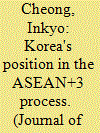

|
|
|
|
|
| Publication |
2008.
|
| Summary/Abstract |
For sveral years after the financial crisis, Korea was Quite an active participant in the ASEAN+3 process, leading the discussion on East Asian economic cooperation through the proposals for the establishment of the East Asian Vision Group (EAVG) and the East Asian Study Group(EASG).
|
|
|
|
|
|
|
|
|
|
|
|
|
|
|
|
| 16 |
ID:
185688
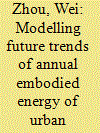

|
|
|
|
|
| Summary/Abstract |
China is the largest driver of growth in the global building sector. The longstanding construction boom across China has generated a massive flow of materials with significant associated embodied energy consumption and carbon emissions. Despite the serious implications for global emissions, there exist a very limited number of macro-level studies on embodied energy of Chinese buildings, with even fewer exploring future scenarios. There is therefore little in the way of an evidence base to offer policy makers. We develop a probabilistic model to forecast the possible trajectories of embodied energy of residential buildings over the medium to long term in the Chinese urban context. Our results provide clear evidence to substantiate the importance of embodied energy of new construction, which we find to be over 0.3 times the operational energy of existing stock between 2010 and 2018. If current trajectories are followed, embodied energy is likely to peak around 2027, with a 95% credible interval ranging from 87 to 283 Mtce (61 to 198 Mtoe) and a mean of 170 Mtce (119 Mtoe). We show that building lifetime has a substantial impact on future annual and cumulative embodied energy. Our findings reinforce the need to take a whole-life perspective to formulate policies addressing building energy as part of China's efforts to meet the announced overarching target of achieving carbon neutrality by 2060.
|
|
|
|
|
|
|
|
|
|
|
|
|
|
|
|
| 17 |
ID:
171498


|
|
|
|
|
| Summary/Abstract |
As highlighted by European policymakers and academic research, the global economic crisis of 2008 emphasized the energy poverty phenomenon. A number of households have had to considerably reduce their energy expenditure but the traditional criteria adopted to calculate energy poverty are not able to measure their number.
Placed in this framework, the paper aims to define a new measure of hidden energy poverty suitable to identify which Italian households restrain their energy consumption due to their inability to afford energy services. A review of the available energy poverty metrics supports the definition of a new indicator that is able to include hidden energy-poor consumers considering some key peculiarities such as the poor energy efficiency of buildings, the poverty situation, low energy consumption and sensitivity to the climate. Using data from the Household Budget Survey provided by the Italian National Institute of Statistics in 2018, the newly identified indicator supports the assessment of the percentage of Italian households in hidden energy poverty and supplies useful insight to policymakers in their effort to support vulnerable consumers.
|
|
|
|
|
|
|
|
|
|
|
|
|
|
|
|
| 18 |
ID:
072677
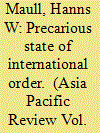

|
|
|
|
|
| Publication |
2006.
|
| Summary/Abstract |
The international order is becoming increasingly precarious as a result of the pressures of globalisation and inadequate policy responses by many states, most importantly the United States, which still holds a pivotal role in building and sustaining international order. The present state of affairs in global governance is characterised by 1) an overwhelming concentration of power at the level of interstate relations but 2) a diffusion of power if we look at the totality of international relations, 3) the erosion of state authority and political legitimacy, 4) the growing importance of markets and of 5) fundamentalist ideologies, 6) the declining utility and the paradoxical impact of force on political order, and 7) by the still indispensable but increasingly fragile base of international order in functioning statehood at the national level. Overall, this situation reflects a mismatch between political demands on and the actual supply of international order whose present state leaves much to be desired. By way of conclusion, the article offers some policy recommendations about how to change the present precarious situation.
|
|
|
|
|
|
|
|
|
|
|
|
|
|
|
|
| 19 |
ID:
141331
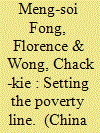

|
|
|
|
|
| Summary/Abstract |
This paper aims to discuss how to properly use the income-based poverty lines to evaluate poor populations and the impact of the government’s policy interventions for alleviating poverty in Hong Kong. It argues that the crucial way to analyse poverty is by using the “pre-intervention” and “post-intervention” income levels as reference points. Once the post-intervention line is accepted by the public to measure the incidence of poverty in Hong Kong, it will enhance our understanding of the cost-effectiveness of the amount of money spent on poverty related measures, and, in return, make it easier to convince the general public with regard to the financial resources that should be allocated for welfare benefits and services, particularly with regard to the “squaring the welfare circle” dilemma.
|
|
|
|
|
|
|
|
|
|
|
|
|
|
|
|
| 20 |
ID:
169627
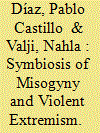

|
|
|
|
|
|
|
|